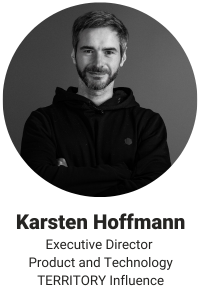Artificial intelligence has the potential to dramatically change the way we work. Having covered how to utilize AI in influencer marketing in our previous article, let’s now focus on our company’s perspective. In this article we provide you with insights from Ramona Meier, Director Client Services at TERRITORY Influence and Karsten Hoffmann, Executive Director Product and Technology at TERRITORY Influence about the current state of how AI can be used in the Influencer Marketing world by giving examples of our agency daily business.
In which specific areas are we at TERRITORY INFLUENCE currently using AI?
KH: To answer this question, we need to differentiate between analytical and generative AI. First one is used for data analysis, pattern recognition and predictions. The second one is used to create text, image, audio and video. While analytical AI is already widely used, generative AI is still largely experimental and not fully ready for commercial use i.e. due to legal uncertainties.
RM: TERRITORY INFLUENCE uses AI, for example, for social listening analyses, allowing us to evaluate trends, content, or moods.
What is already working very well today? What not?
RM: What works is that we definitely increase our daily productivity through AI. Be it translations, image creations or editing concepts. Moreover, we see significant advances in image AI, for inspirations, with mood board creation we inspire influencers and can share a better understanding of brand and values. Recently, solutions have been launched in the market that can be used in a legally secure manner. Then there are areas where AI is supportive in the influencer marketing process: For pre-selection of potentially suitable influencers (e.g., interests, audience demographics, related profiles). However, the selection must be checked by experienced experts to be able to make a final selection. In addition to numbers like reach and engagement what matters to us are i.e. sociodemographics, interests, history. AI can currently only help with that to a very limited extend. AI does help to keep an eye on influencer profiles that may become relevant in the future. We also use tools for quality assurance, for example, to get indications of follower or engagement manipulation. Rough predictions on performance based on historical data can also be made. What is not working at all is automation in the communication and coordination process. Influencer marketing is a people business, where it is constantly necessary to weigh and mediate between customers, influencers, and their audience interests and preferences, and this cannot be replaced by AI.
Which tools support TERRITORY INFLUENCE already?
KH: We currently rely on a mix of third-party providers and our own software development. For “Classic” influencer marketing, where only a few influencers with large to huge reach are used in a campaign we rely on third-party offers. Then there are nano influencer marketing campaigns, where thousands of people need to be found, coordinated, and guided in a single campaign. So, in this case, we have our own software development. While analytical AI is already in use in almost every tool, we are right now experimenting with generative AI. We constantly evaluate potential added value for individual process steps.
What are technical challenges that need to be solved to make the most of AI?
KH: In analytical AI, there are challenges with the availability of platform data. External access to data has been increasingly restricted recently, with Meta, for example, greatly reducing the public availability of their data in recent years. The type of data varies greatly from platform to platform due to individually defined calculation metrics. In generative AI, the biggest hurdle is certainly still the legal area, particularly with regard to the unresolved copyright discussion.
Our ultimate tips:
KH: Take the new AI developments seriously, but don’t drive yourselves crazy. Instead, create spaces for experimentation and visible places where learned knowledge can be documented, and experiences can be shared. Ensure practical relevance and provide your organization with not only successes but also learnings and the sometimes very arduous path to success or weaknesses. This lowers barriers, invites participation, and assists in evaluating scalability and thus business potential. Don’t just “do something with AI” but fillet your processes and workflows and check where AI can offer the greatest added value. Good indicators are repetitive tasks and self-similarity of results (in terms of content, structure) or if a large number of different results are to be deliberately generated from which a selection is then made.
What is the future role of AI in the influencer marketing world? Which developments or trends do you expect?
KH: Influencers are already experimenting with generative AI. Adventurous influencers will discover ways to tell new and better stories using this technology. The central currency for influencers is the trust of their community (and, of course, their collaborators). Transparency regarding the use of AI will become another important factor for quality. Influencers will begin expanding their audience across language barriers using automatic translations and digital twins, thereby increasing their reach.
The development of influencer avatars, as recently introduced by Meta, is also intriguing. This refers to the ability to interact directly with a digital twin of an influencer. These could be interesting extensions of influencer personalities. Virtual influencers are, in our opinion, a fascinating niche topic and currently require specialized teams to exist and remain relevant.
In the end, it always comes down to building a relationship with the audience and keeping them engaged. Influencers who are not unique or trustworthy quickly become uninteresting for brands. The core of influencer marketing is and will remain humanity.



